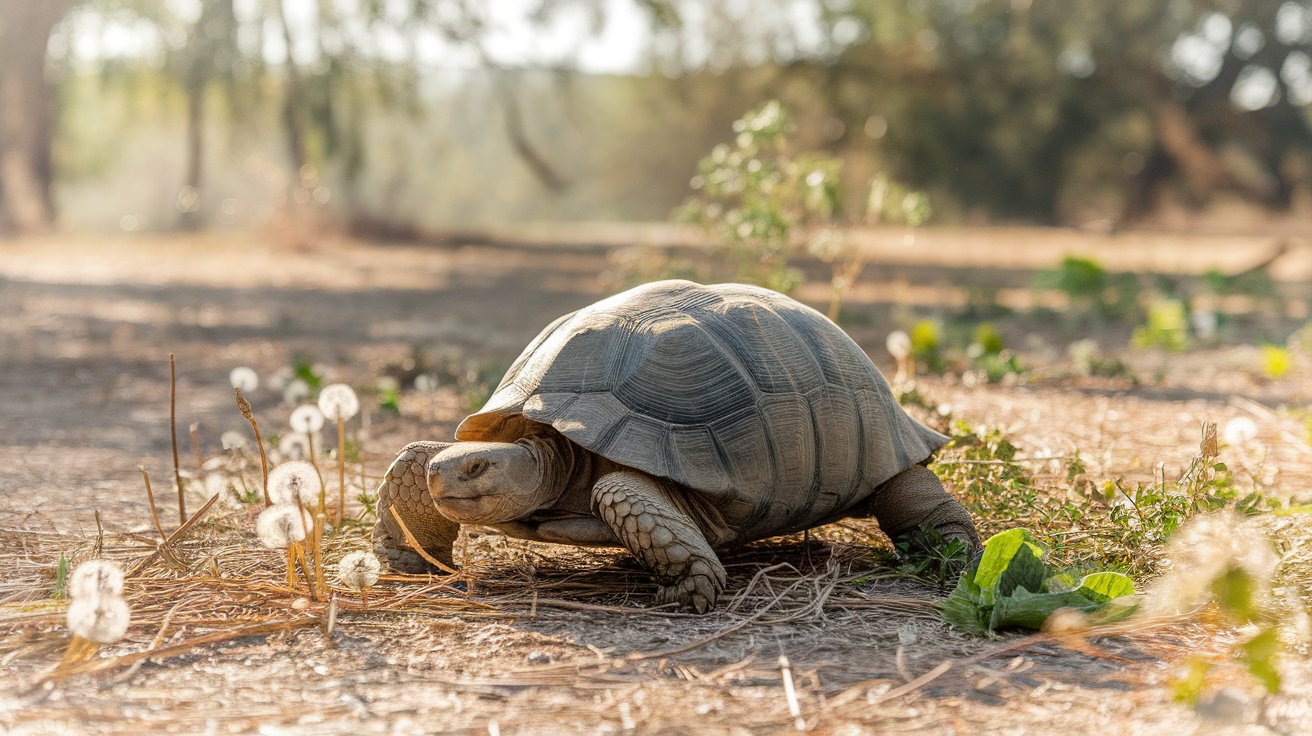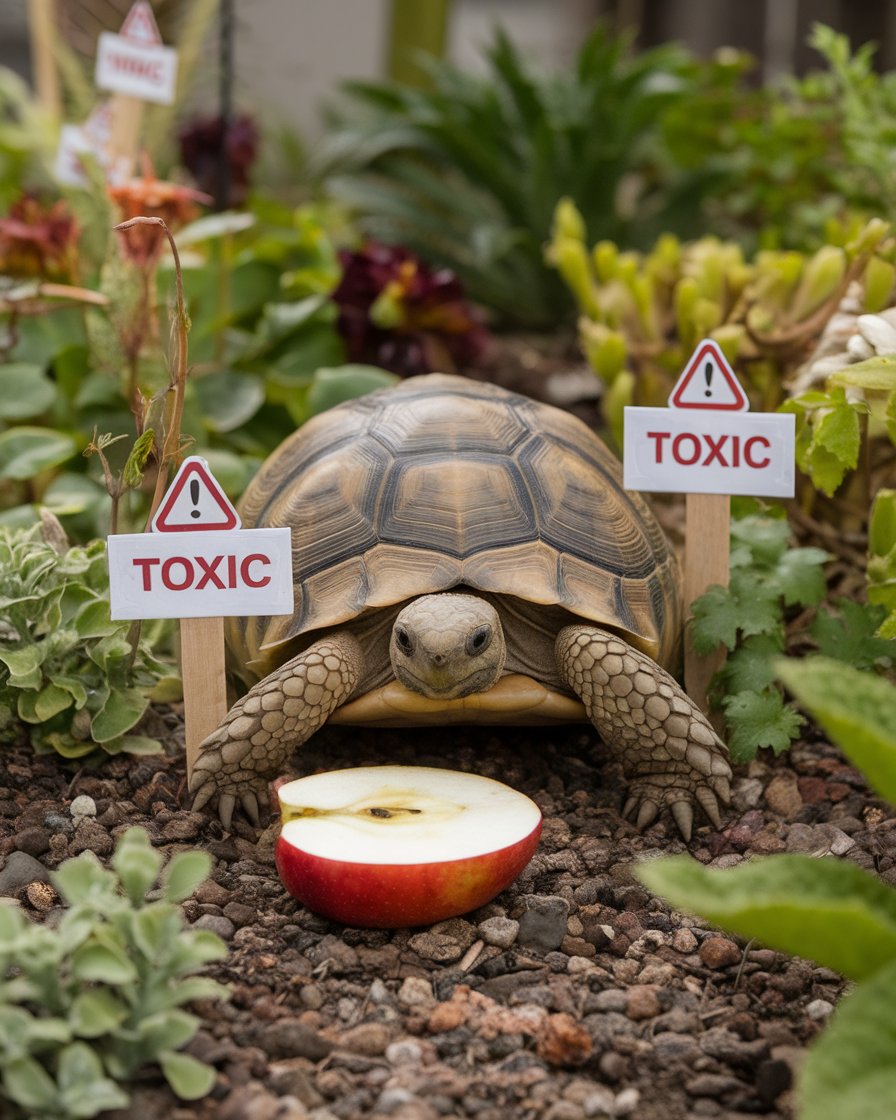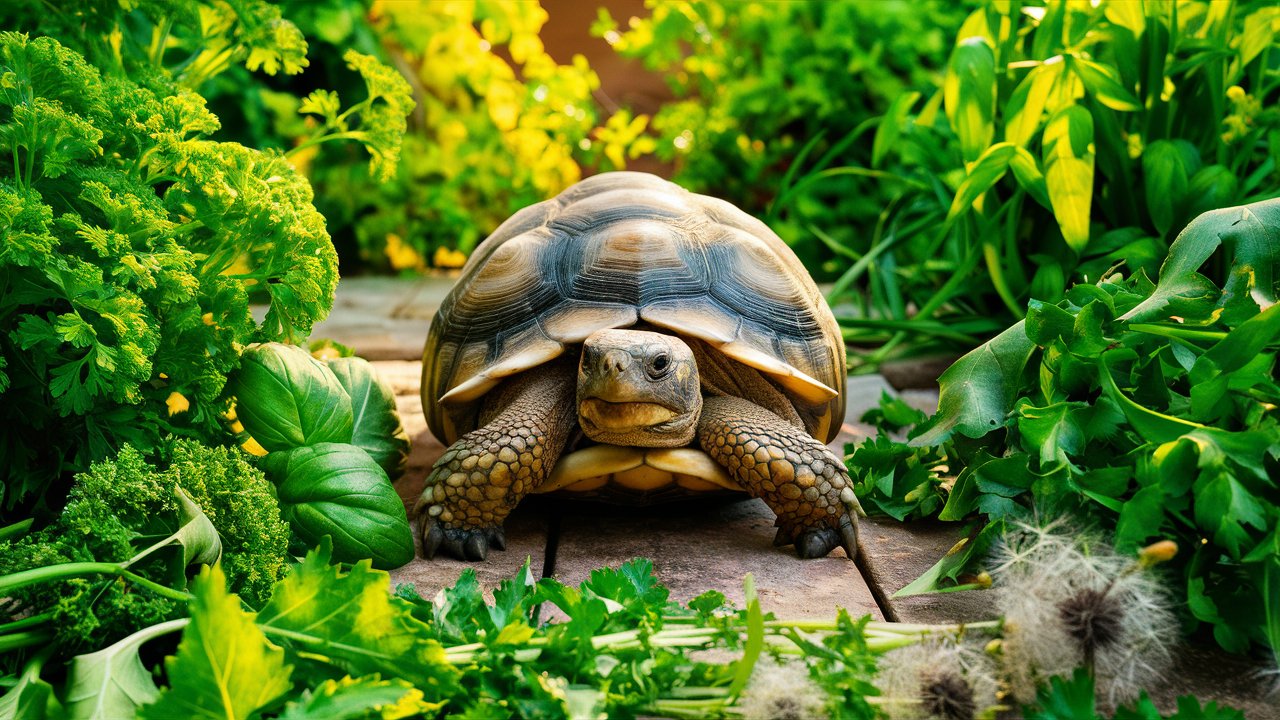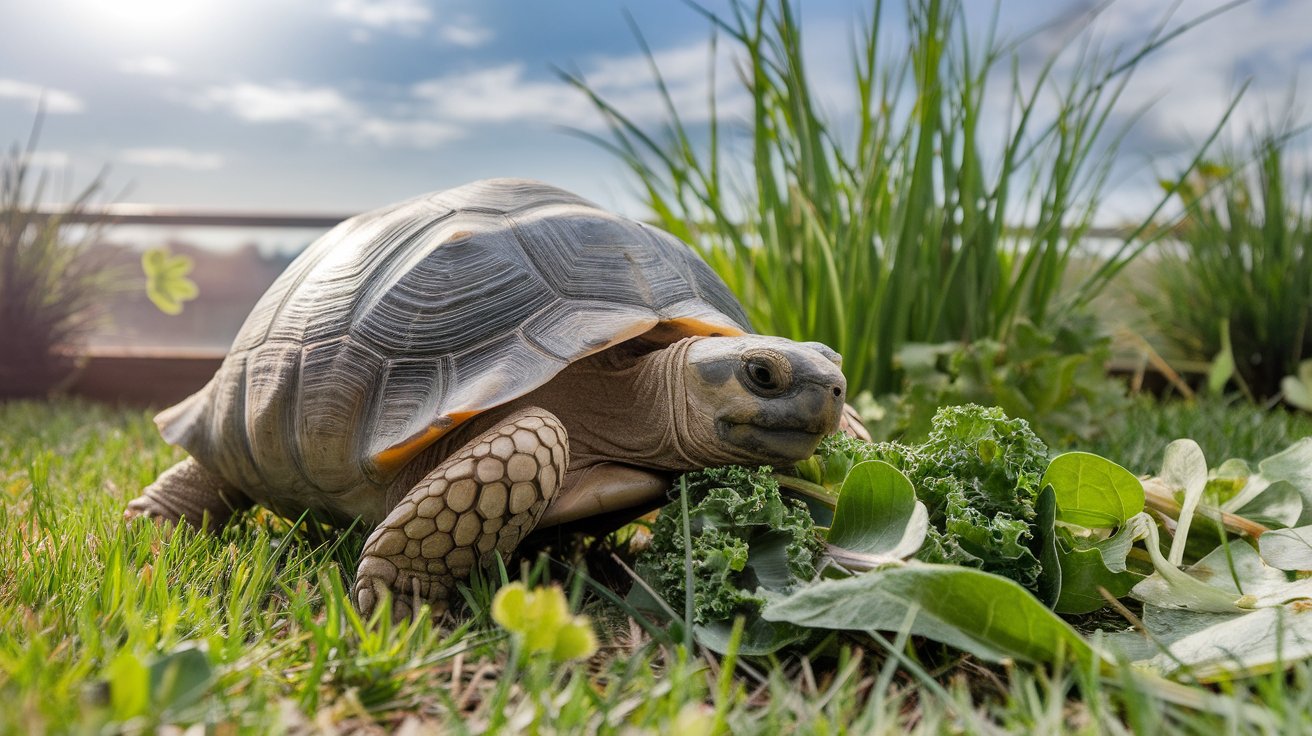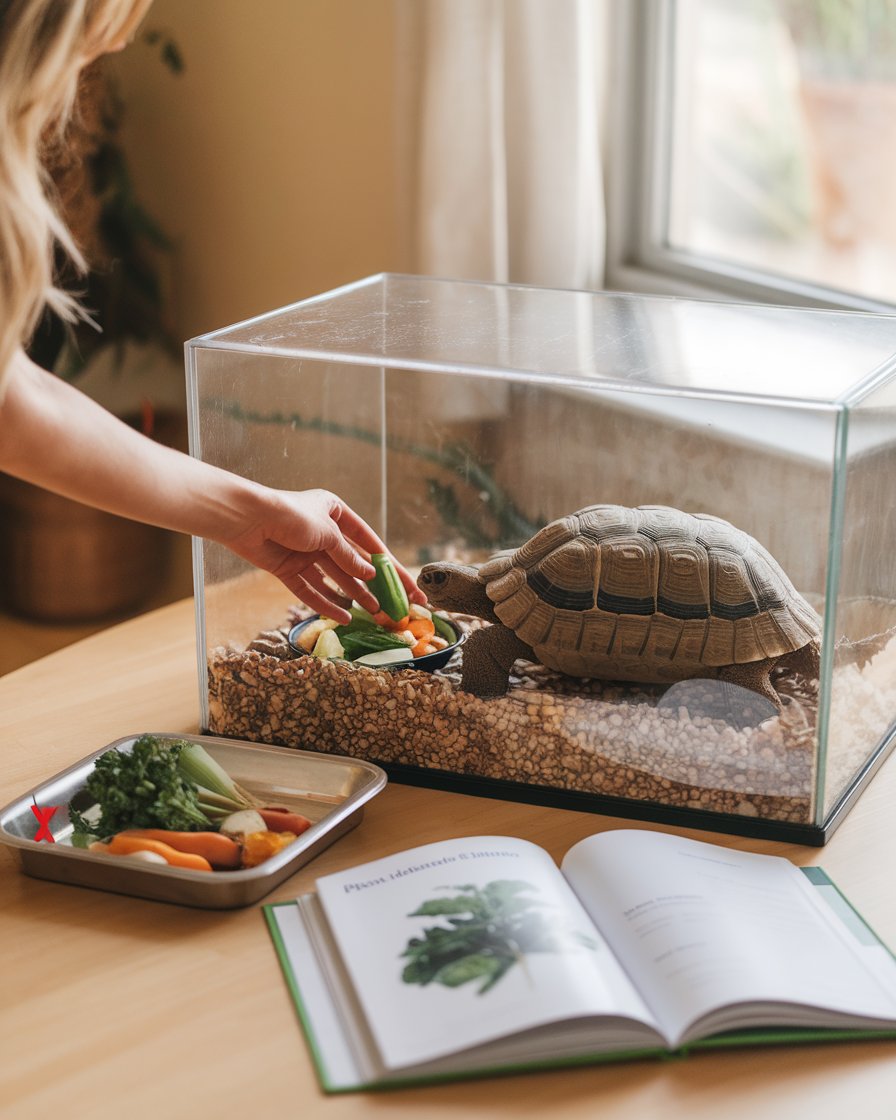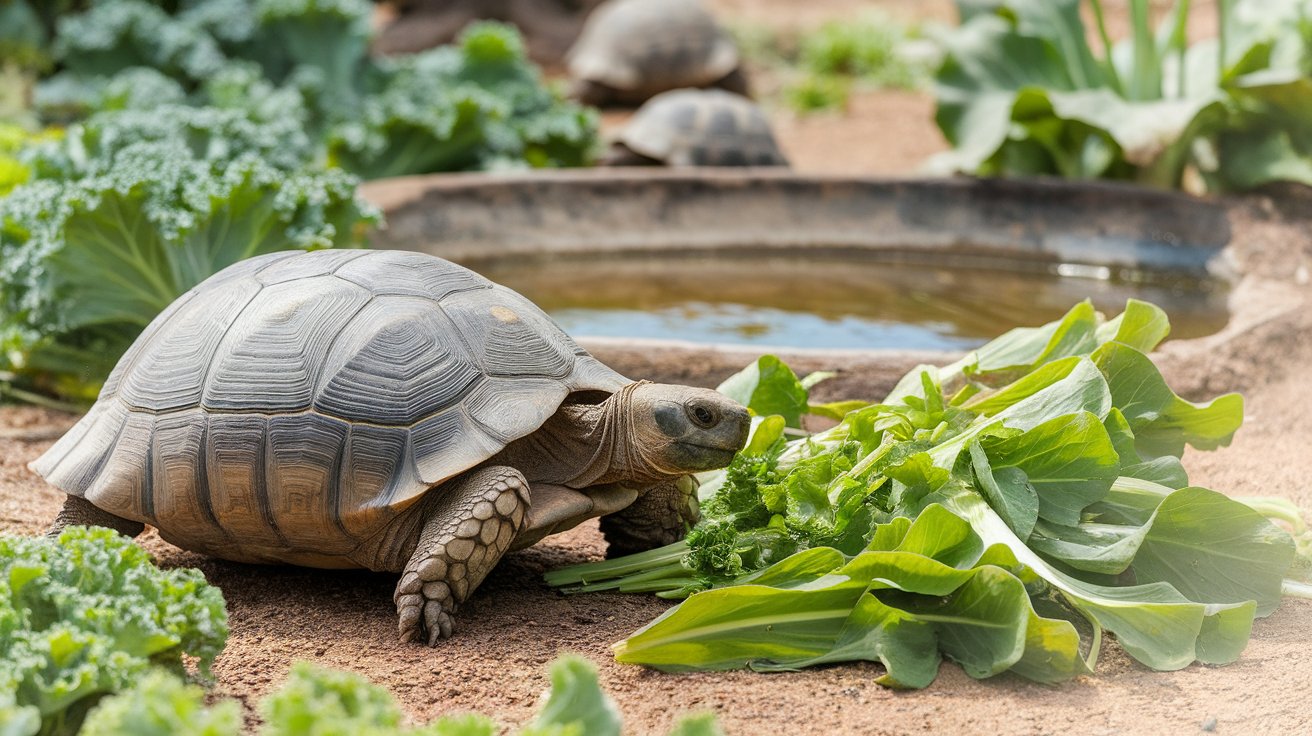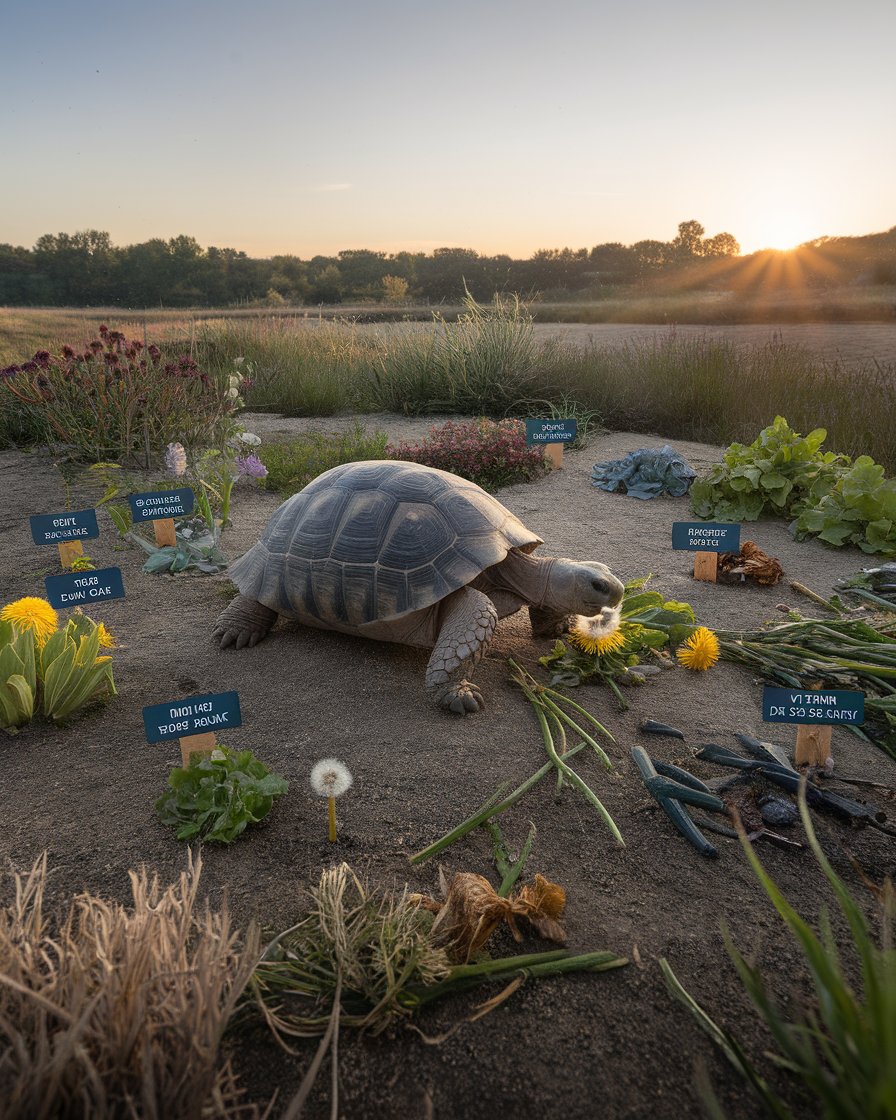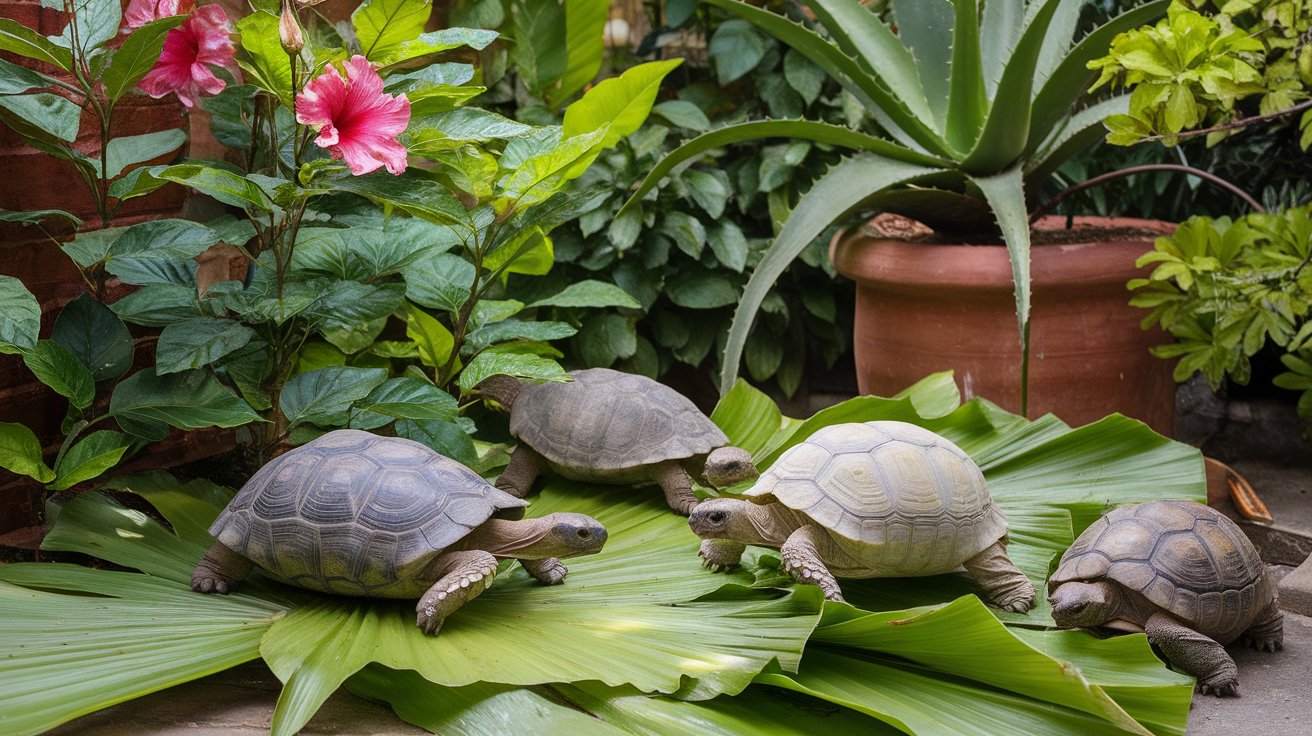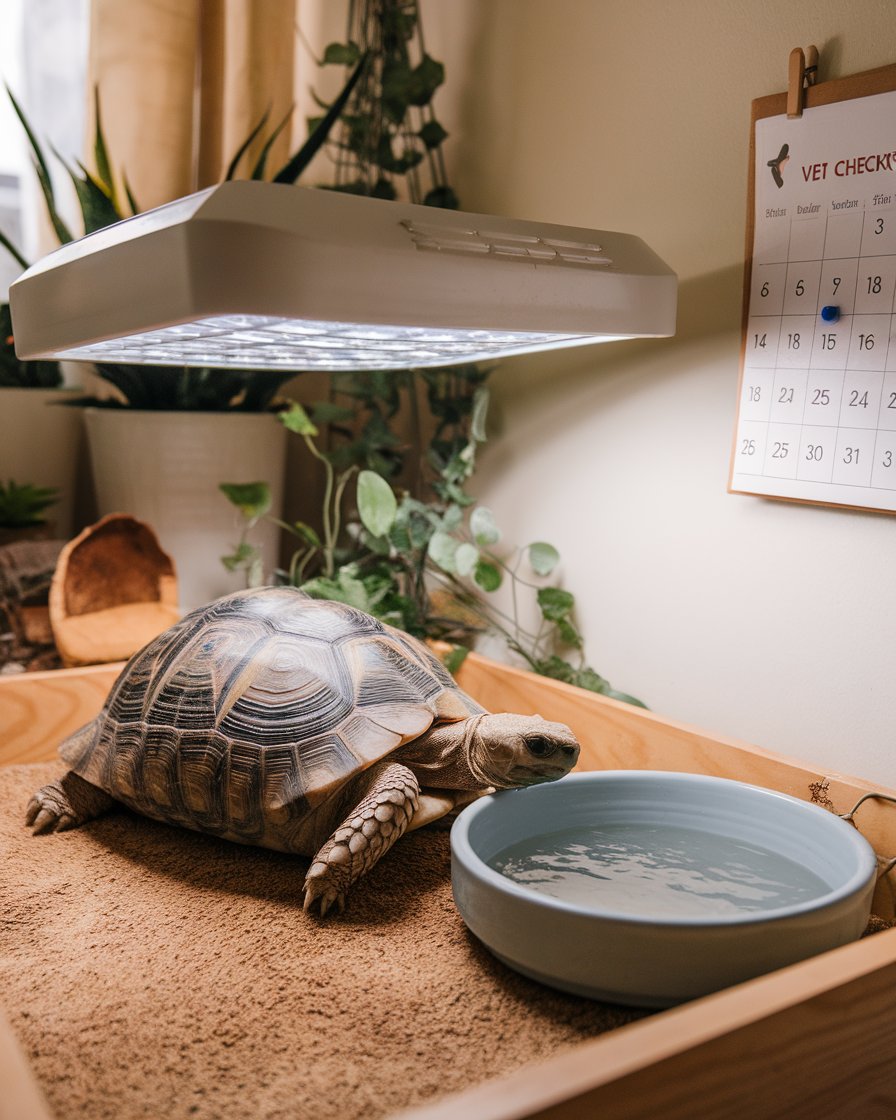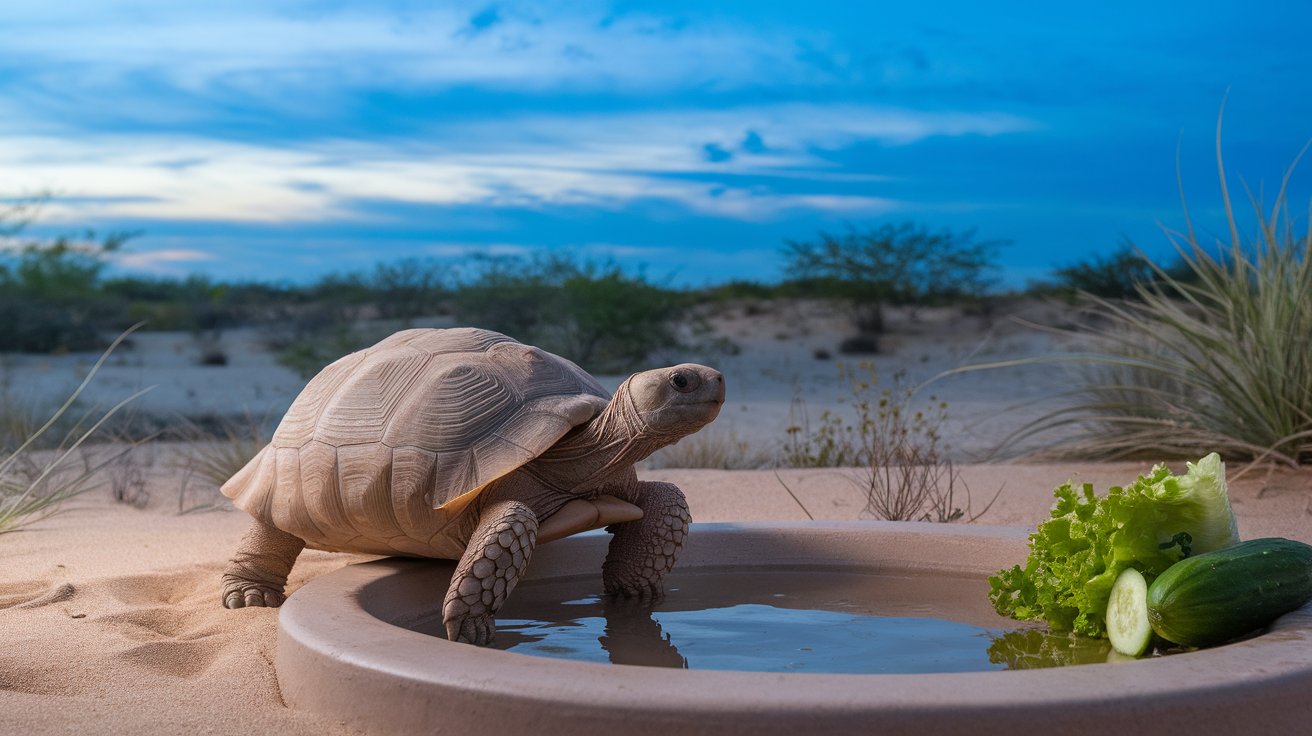Introduction
When caring for a pet tortoise, diet is just one aspect of ensuring its overall health. Tortoises require a balance of nutrients that supports not only their shell and bone growth but also their energy levels and metabolic health. While tortoises can eat a variety of leafy greens and fibrous plants, it’s crucial to offer them the right foods and avoid items they can’t digest properly. Foods like leafy greens and vegetables, such as dandelions and carrots, are great for providing a natural balance of nutrients. However, avoid feeding your tortoise commercial foods that may lack the necessary vitamins and minerals needed for their long-term well-being.
Beyond diet, tortoises also need access to fresh water daily. Tortoises need water to stay hydrated, and it’s important to monitor their intake, especially during warmer months. Make sure your tortoise’s food is varied, and avoid offering high sugar content in fruit, which can cause health problems over time. Maintaining proper hydration, alongside a well-rounded diet, will ensure your tortoise thrives.
Key Takeaways
- A balanced diet rich in fibrous plants and leafy greens supports a tortoise’s shell and bone health.
- Commercially grown fruits with high sugar content should be given in moderation to avoid health problems.
- Unidentified plants from your garden can be toxic, so always consult a specialist before feeding them to your tortoise.
- Organic vegetables are a safer option for tortoises as they are free from harmful chemicals and pesticides.
- Offering a variety of plants mimics the natural diet of wild tortoises and ensures they get a wide range of nutrients.
- Proper hydration, along with regular check-ups for shell and beak health, is essential to maintaining your tortoise’s well-being.
Toxic Tortoise Food List
When it comes to keeping your pet tortoise healthy, their diet is key. While tortoises enjoy a variety of fresh foods, not all fruits and plants are safe for them. Some commercially grown fruits and unknown garden plants can be toxic or cause long-term health issues if consumed regularly. It’s essential to know what your tortoise can and cannot eat to ensure they live a healthy, balanced life. The right diet can provide important nutrients like calcium and vitamin D3, while avoiding harmful foods keeps your tortoise safe from digestive issues and other potential risks. Let’s explore two common hazards in tortoise diets: fruits with high sugar content and unidentified garden plants.
Common Foods to Avoid in Your Tortoise’s Natural Diet
1. High-Sugar Fruits
While fruits like apples, berries, and melons are tempting to feed tortoises, they contain high levels of sugar. Feeding these sugary fruits too often can disrupt your tortoise’s natural diet, leading to obesity and health problems like poor calcium and vitamin D3 absorption. It’s essential to offer such fruits sparingly to maintain a balanced diet. Tortoises, especially sulcata or mediterranean species, thrive better on fibrous plants and leafy greens rather than high-sugar fruits. Stick to a few small amounts, making vegetables and safer plants the staple of their diet.
2. Toxic Garden Plants
Garden plants that might seem harmless to us can be dangerous to tortoises. Many unidentified plants found in gardens can be toxic if consumed. Red-footed tortoises and russian tortoises, for example, are highly sensitive to plants they wouldn’t naturally encounter in the wild. To ensure your tortoise’s safety, always verify that the plants are safe before letting them graze. Consulting a vet or a plant specialist is crucial to avoid potentially harmful plants that may lead to severe health issues.
3. Vegetables High in Oxalic Acid
Some vegetables, like spinach and beet greens, contain high levels of oxalic acid, which can block calcium absorption, essential for your tortoise’s shell and bone health. Over time, feeding these vegetables regularly can lead to calcium deficiencies and shell deformities. It’s best to limit these vegetables and instead focus on feeding your tortoise leafy greens such as dandelions, which are safer and rich in calcium. This ensures a better balance of nutrients that your tortoise needs to stay healthy.
4. Commercially Processed Foods
Commercial tortoise foods are widely available but are not always the best choice. These foods often lack the natural nutrients found in fresh plants and may include preservatives or additives harmful to your tortoise’s health. Tortoises, especially those that eat grass and fibrous plants in the wild, need food with calcium and other essential minerals to maintain proper shell growth and avoid metabolic bone disease. It’s better to provide fresh vegetables and avoid processed foods that don’t offer the same level of nutrition.
5. Animal Protein
While some tortoise species, such as turtles, may occasionally eat animal protein, most tortoises cannot digest it properly. Feeding animal protein can cause serious health problems, including kidney failure. Tortoises are primarily herbivores, and their natural diet consists mainly of plants, leafy greens, and grasses. Avoid giving your tortoise foods like meat or dairy, as it can disrupt their digestive system and lead to long-term health complications.
Commercially grown fruits with high sugar content
Tortoise owners should be cautious with fruits like apples, berries, and melons. While these are tempting treats for your tortoise, they contain high amounts of sugar, which can lead to obesity and other health problems. Tortoises, especially species like the sulcata or mediterranean tortoises, thrive on fibrous plants and leafy greens. Feeding them sugary fruits too often can disrupt their natural diet and cause imbalances in calcium and vitamin D3 absorption, which are vital for their health. Stick to small amounts of fruit and focus on providing fresh vegetables and safe plants to supplement their diet in moderation.
Unidentified plants from your garden
One common mistake pet owners make is allowing their tortoises to graze on plants in their gardens without checking if they are safe. Many garden plants, while seemingly harmless, can be highly toxic to tortoises. Species like the red-footed tortoises and russian tortoises are particularly susceptible to poisoning from plants they would never encounter in their natural habitat. To avoid this, always ensure any plant offered has been researched or verified by a vet or specialist. Feeding tortoises unknown plants can lead to serious health issues, so it’s crucial to stick with safe, nutritious foods that align with their natural grazing habits.
Guidelines for Feeding Your Tortoise
Feeding your tortoise the right foods is essential for their health and longevity. As tortoises are herbivores, their diet should consist mainly of fresh vegetables, fibrous plants, and occasional fruits. However, not all fruits and vegetables are safe for tortoises, and some can even be harmful if consumed in large amounts. For instance, species like the sulcata tortoise and desert tortoises are known to thrive on leafy greens such as dandelion and grasses. Providing a balanced diet, rich in calcium and other nutrients, is key to supporting their growth and preventing deficiencies. It’s also important to avoid feeding them foods that are high in oxalic acid, which can hinder calcium absorption and lead to health issues.
Case Study: The Impact of Feeding Incorrect Foods to Sulcata Tortoises
In a study conducted by a veterinary research team, a group of sulcata tortoises was monitored to observe the effects of incorrect feeding habits over several months. The owners had unintentionally been feeding their tortoises a diet high in oxalic acid vegetables like spinach and fruits with high sugar content, which led to several health issues. Many of the tortoises developed calcium deficiencies, resulting in shell deformities and weakened bone structures. The study emphasized the importance of feeding sulcata tortoises fibrous plants such as dandelions and grasses, which are more in line with their natural diet.
After adjusting the diet to include organic vegetables and plants low in oxalic acid, the tortoises began showing signs of recovery, with improved shell growth and overall vitality. This case highlights the need for tortoise owners to provide a balanced, species-appropriate diet to ensure long-term health and longevity.
Buy organic vegetables and plants
To keep your tortoise healthy, it’s recommended to buy organic vegetables and plants. Non-organic produce is often treated with pesticides and chemicals, which can be harmful to tortoises, especially when consumed over time. Organic vegetables like cabbage, leafy greens, and dandelions are a much safer option as they are free from toxic residues. Tortoises, especially species like the geochelone sulcata and indian star tortoises, benefit greatly from consuming food that closely resembles what they would eat in the wild. Prioritizing organic produce ensures they are getting the best nutritional value without exposure to harmful chemicals. This is a small but important step in maintaining a healthy and balanced diet for your tortoise.
Consult a specialist for plant identification
It’s crucial to consult a plant specialist when feeding tortoises, especially if you are unsure about the safety of plants in your garden. Wild tortoises and species like tropical tortoises have evolved to eat specific plants in their natural habitats, and some common plants can be toxic or difficult for tortoises to digest. A plant that seems harmless to us might pose serious risks to your tortoise’s health. Consulting a vet or an expert in tortoise care can help identify safe plants that match your pet’s dietary needs. By ensuring your tortoise’s diet includes the right foods, you reduce the risk of feeding them harmful plants and support their overall well-being.
Variability in Tortoise Diet
Tortoises, like many reptiles, require a varied and well-balanced diet to thrive. Their natural diet in the wild consists of a broad range of plants, which provides essential nutrients that support their health and longevity. In captivity, it’s important for owners to mimic this diet by offering a wide variety of safe plants and vegetables. Species of tortoises, such as sulcata and forest tortoises, can benefit greatly from consuming fibrous plants, grasses, and leafy greens. Without enough variety, tortoises may miss out on vital nutrients, which can lead to health problems. By diversifying the food you provide, you ensure your tortoise gets the right mix of vitamins and minerals to keep them healthy and active.
Importance of offering a variety of plants
Offering a variety of plants is essential for your tortoise’s overall well-being. In their natural habitat, tortoises graze on a wide range of plant species, each offering different nutritional benefits. Relying too much on a single type of food can create nutrient deficiencies that affect their long-term health. For example, leafy greens like dandelion are rich in calcium, which is vital for tortoise shell and bone development. Tortoises also benefit from consuming a mix of weeds, flowers, and vegetables, which can replicate the diversity they experience in the wild. A varied diet helps ensure they are getting a balance of essential nutrients and prevents digestive issues that can arise from feeding them the same food repeatedly.
Number of plant species tortoises eat in the wild
In the wild, tortoises are known to eat around 200 different plant species throughout the year. This natural diet shifts with the seasons, as certain plants become more abundant while others fade. No single plant dominates their diet for too long, which helps to avoid the risks associated with consuming too much of one type of food. Tortoises cannot digest some plants properly if eaten too often, making variety key to their survival. For example, some species of tortoise graze on fibrous grasses while others feed on flowers and leafy vegetables, ensuring they receive a well-rounded intake of nutrients. Mimicking this diversity in captivity can help maintain a healthy tortoise.
“The greatness of a nation and its moral progress can be judged by the way its animals are treated.” — Mahatma Gandhi
Considerations Beyond Diet
When caring for a tortoise, diet is important, but there are other crucial factors to consider as well. Proper hydration, shell health, and beak maintenance play a big role in the overall well-being of your tortoise. Ensuring that these areas are managed alongside a balanced diet will help keep your tortoise healthy and active. Owners of tortoise species such as sulcata or russian tortoises must provide the right conditions, ensuring that their pets receive the necessary care beyond just food. By paying attention to details like shell growth and hydration, you can give your tortoise a comprehensive care routine that supports both physical and metabolic health.
Monitoring shell growth and beak management
Shell and beak health are key indicators of your tortoise’s overall well-being. A tortoise’s shell should grow smoothly and symmetrically, without signs of pyramiding or deformities, which can occur from poor nutrition. Regularly feeding your tortoise a variety of leafy greens, like those rich in calcium, supports healthy shell growth. Additionally, the beak of a tortoise can overgrow if not managed properly. Providing tough, fibrous plants and materials for them to chew on helps naturally wear down their beaks. Regular check-ups with a vet can also ensure that your tortoise is developing correctly and that any potential issues with their shell or beak are addressed early.
Ensuring proper hydration
Hydration is just as important as diet for maintaining your tortoise’s health. Tortoises need access to fresh water daily, and providing a shallow dish for them to soak in can help with hydration. Soaking not only helps them stay hydrated but also supports their skin and shell health. Tortoises, especially those living indoors, may not always drink enough on their own, so soaking becomes an essential practice. During hot weather, dehydration risks increase, making it crucial to monitor their water intake more closely. A hydrated tortoise is less likely to develop kidney issues and other complications that arise from a lack of proper hydration, ensuring a longer, healthier life.
Conclusion
Taking care of a pet tortoise isn’t just about feeding them any food—it’s about giving them the right food. Tortoises need to eat grass and a mix of vegetables such as carrots, leafy greens, and other healthy food items. A diet like this helps them grow strong shells and bones and keeps their energy up. Plus, they need access to water every day to stay hydrated, especially during warm times of the week.
It’s also super important to know what tortoises can’t eat. Feeding them the wrong foods, like some commercial tortoise foods, can cause health problems. A list of safe foods helps make sure they get food with calcium and other nutrients they need to grow. By giving your tortoise a variety of food types, you’re setting them up for a long and healthy life. Keep an eye on what they need to eat to stay happy and thriving!

